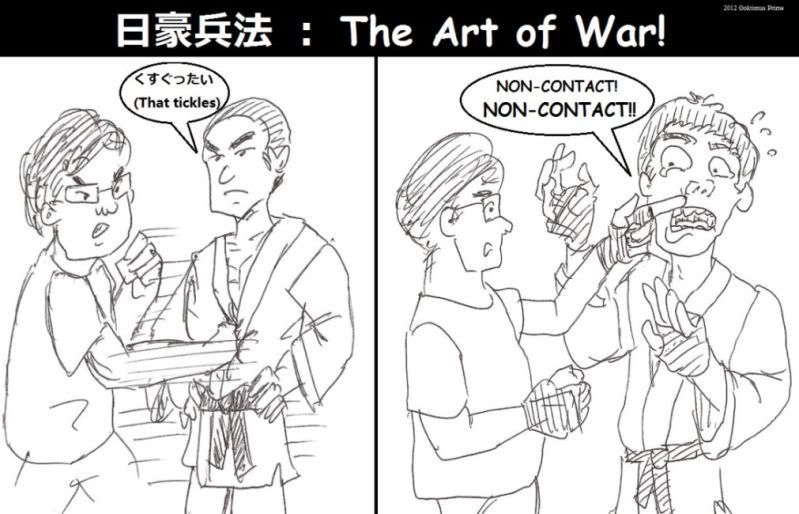-
13th May 2012, 12:51 AM
#11

 Umm... okay?
Umm... okay?
Anyway, allow me to simplify what I said in my previous post(s) like this:
Any opinions expressed by me about GKR are based on my experiences with individual schools that I have participated in and do not necessarily reflect an extension of how it may be practised or taught in other schools.
Here's a quick sketch I made contrasting my experience of Karate at my local GKR dojos, with my experience of Okinawan Goju Karate in a dojo in Japan. 

The practitioner of traditional Okinawan Karate asked me to punch him as hard as I could, as many times as I liked. He didn't flinch. At my GKR Dojo, if I so much as tap my partner they cry foul. 
I understand the need for safety in training. As I've mentioned many times on this thread, martial arts teachers have a legal duty of care. Having said that...
1. Safety shouldn't mean that training is so far "sanitised" that it becomes counter-productive to teaching students how to fight. Tip sparring works on the same principle as Touch Footy. Instead of hard contact (e.g. punching or tackling), you just tip and that counts as a "hit". It doesn't hurt, but it gives you tactile feedback letting you know that you've been "hit" (or "tackled" in the case of Touch Footy). Could you imagine trying to play Non-Contact Footy?
2. Insurance will cover schools/instructors so long as reasonable care is taken. Insurance companies recognise that martial arts is a potentially dangerous activity... that's why you take out insurance. But so long as reasonable measures are in place, then insurance companies will cover you. e.g. providing students with safety equipment, giving reasonable instructions for safety (e.g. tipping only, no full strengthed strikes, instructors have valid first aid training, coaching qualifications etc.). Teachers/schools get in trouble is where there are reasonable measures aren't taken and are found to be negligent and/or derelict in their duty of care. If you try to provide a reasonably safe training environment and an injury occurs, then you're covered. It's the same legal duty of care that school teachers have.
 Posting Permissions
Posting Permissions
- You may not post new threads
- You may not post replies
- You may not post attachments
- You may not edit your posts
-
Forum Rules
Umm... okay?










 Reply With Quote
Reply With Quote